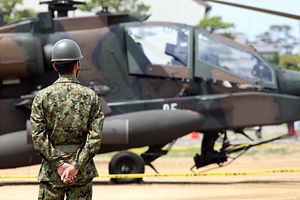Japanese Prime Minister Shinzo Abe and the ruling Liberal Democratic Party (LDP) plan to draw up a new permanent law that would accelerate the deployment of the Japanese Self-Defense Forces (JSDF) for peacekeeping operations and speed-up JSDF logistical support for the United States and other regional allies.
Shinzo Abe’s stated aim is to pass new legislation in the first few months of 2015. Back in December 2014, the Japanese prime minister instructed the newly appointed Defense Minister Gen Nakatoni – a former JSDF officer and graduate of the prestigious National Defense Academy – to create a legal framework to enable a “seamless” response to security contingencies threatening Japan.
In the past, the Japanese Diet had to pass ad-hoc laws to authorize the deployment of JSDF forces abroad. For example, special legislation was passed for Japan to participate in refueling missions to support multinational forces in Afghanistan in the early 2000, or to dispatch the JSDF to “non-combat areas” in Iraq.
Japan’s new security policy, adopted in July 2014 by the Cabinet, laid the groundwork for this new legislation by calling for a “seamless security legislation to ensure Japan’s survival and protect its people.” The document specifically addressed logistical support stating that, “it is necessary to enable the SDF to play sufficient roles in wide-ranging support activities for peace and stability of the international community. It is also vital from the viewpoint of ensuring Japan’s peace and security to enable the carrying out of such activities more than before without hindrance.” A separate law on U.N. peacekeeping operations already exists and discussion will have to focus on how to harmonize this piece of legislation with the new law.
The LDP’s principle obstacle to a quick adaptation is its junior coalition partner, the Komeito party, which fears that the country might be drawn into conflicts where Japan’s national security is not directly at risk. According to the Japan Times, the Komeito party’s head of the diplomacy and security panel, Shigeki Sato, stated that a new permanent law governing the deployment of troops abroad is not “the highest priority.” The party is also afraid that the new law would de-facto integrate Japan’s military into the use of force by other countries.
The Komeito party won four additional seats in the December 2014 Lower House elections (conversely the LDP lost three) , which some analysts interpret as a masked and quiet power shift toward the liberal-center and away from national right-wing forces. However, the appointment of Gen Nakatani, a lawmaker who is in favor of “having the ability to hit enemy bases pre-emptively in the face of imminent attack,” is a strong signal that the LDP will not easily give up on its goal to rid Japan of its free rider image in matters of international and national security. Also, in comparison to amending Article 9 of the constitution, a new permanent law on dispatching JSDF overseas would not require constitutional revision.

































